So many books, so little time. I first saw this message, a quarter-century ago, if I remember correctly, on the carry bags of a small delightful bookshop in Washington, D.C.
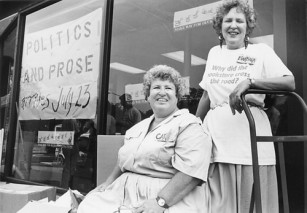
Politics & Prose was set up by Carla Cohen and Barbara Meade at 5010 Connecticut in the autumn of 1984.They ran it themselves with a part-time employee who worked at night. Today, the staff numbers more than 100.
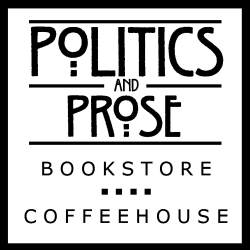
P&P sold books — but of course! — cards for all occasions, gift wrapping and small gifts. It was a warm and cosy place, and one could spend hours just walking around, looking at the books, browsing through any that caught one’s fancy. At the back, on the lower level, was a small nook, now known as The Den, where one could linger over coffee ’n’ cookies , without feeling the pressure to ‘move on’. I was lucky enough to visit it a few times, and watched it grow over the years, and relocate to a larger space across the street.
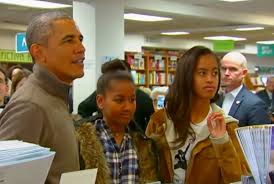
Among personalities who have spent many happy hours at P&P – President Barack Obama, with his daughters, Sasha and Malia, celebrating ‘Small Business Saturday’, in December 2013.

Bill Clinton signing copies of his book in 2011.

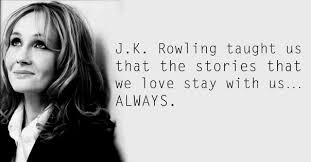
Authors J.K. Rowling and Salman Rushdie, photographer Annie Leibovitz, the American portrait photographer, well known for her intimate photographs of celebrities.
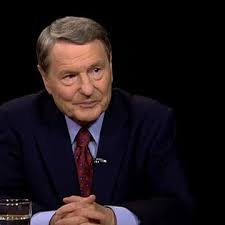
Now, P&P is seen as part of D.C. culture. A few years ago, when there was a move to sell the store for personal reasons, Jim Lehrer, American journalist and novelist, and known for his role as a debate moderator in U.S. presidential election campaigns, wrote, ‘… putting Politics & Prose up for sale is like putting the Washington Monument up for sale.’
Yes, indeed … so little time. The plaintive moan of so many of us readers across the world. But, we do our best to cope with the wellnigh-insurmounable odds, don’t we? We have to pick and choose; decide whether we are content to stay with our most favoured authors; or explore new writers; go by the list of best-sellers or stick to the Man Booker nominees and winners, the Pulitzer Prize winners. When passing by a well-stocked book-shop, we have to fight the temptation to go in and maybe — true to our resolution to buy no more books — just browse around a bit, breathing in the heavenly smell of books.
There are alternatives, I guess: Some of us restrict ourselves to the services of lending libraries; others, more reckless, keep on buying books, attending every book sale, adding to their collection. A friend of mine has like, a million books on her bookshelves, a zillion books on her Kindle, admits she is never in her lifetime going to be able to go through them but … she loves them all, is proud of them and keeps buying more.
My sister and I were introduced to the world of books by my father who was a civil engineer, and was posted in different places. His father, who owned a bookshop, was no reader; in fact, he may be said to have hated books although his livelihood depended on them. My mother read a little, but she was more interested in sewing and embroidery in which she excelled.
So, it came as a total surprise to my sister and me when we discovered during our early teens, in a store-room, a wooden chest filled with books which our other had won as prizes in school. (I don’t even know how many of them she did read.) Those were my earliest memories of books which may be termed as ‘classics’: Mrs Gaskell’s Cranford; Thomas Hughes’s Tom Brown’s School Days; Mrs Henry Woods’s The Channings and Roland Yorke; Jane Austen’s Pride and Prejudice; Scott’s Ivanhoe; Thackeray’s Vanity Fair. And many others.
Due to my father’s frequent postings in distant places, we were sent away to a boarding school in Vishakapatnam (it was then known as Vizagapatam), where I was put in charge of the library for the senior classes.
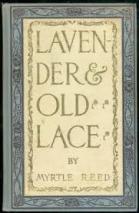
One day, going through the shelves, I came across a book which was as different from anything I had read until then as chalk and cheese. It was a Victorian romance novel, titled Lavender & Old Lace, written in 1902 by Myrtle Reed. That was the very first ‘romance’ I read. After all, it was 1948, I was a sheltered 15-year-old girl, studying in a boarding school supervised by nuns. What did I know about romance?
So, of course, I devoured it, and passed it on to my sister, friends … The headmistress — who was also the English language teacher and a nun, to boot — soon noted that a particular book was being passed rapidly from hand to hand among a gaggle of schoolgirls not particularly known for love of reading.
So, she took it from the then-resident reader, raised her eyebrows at the title, and asked me, the librarian, where I had got it from. I said from among the ‘classics’. She believed me, but confiscated the book. Can you imagine the disappointment of the girls who were left slavering for it?
And then, there was the case of Gone With The Wind. My sister and I were home for the holidays, my father took us to see the movie which was then running at a local movie house, and, of course, we fell in love with it. How could one not? How could one forget Rhett Butler (played by Clark Gable) as he looks quizzically at Scarlett O’Hara (played by Vivien Leigh) going up the staircase (below l), or his parting words to her, ‘Frankly, my dear, I don’t give a damn!’ (below r)
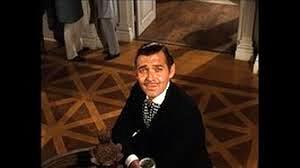
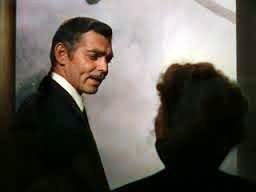
My father bought me the book which I took back to school. Innocent that I was — and of course, a total fool — I showed it to the boarding school mistress, a forbidding Scotswoman, and asked permission to read it through the school term. She opened it, read the first line, ‘Scarlett O’Hara was not beautiful, but men seldom realized it when caught by her charm as the Tarleton twins were,’ and gently suggested that she keep it for me until the holidays.
She ‘kept’ it in the changing room, in a cupboard of supplies, which was opened only on Saturdays, and promptly locked again. Some Saturdays, she forgot to re-lock it and I would be in heaven: I would sneak in there, and hurriedly read a few pages before going down for breakfast. Sometimes, she didn’t forget, and it was, indeed a dry week for me, bereft of Rhett and Scarlett … But, that was how I read GWTW, all 500 plus pages of it!
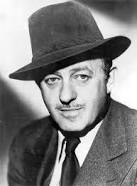
Writing this has made me remember how much I had loved both the movie and the book and, maybe, one reason lies in this quotation by Ben Hecht, American screenwriter, director, producer, playwright, journalist and novelist:
‘There was a land of Cavaliers and Cotton Fields called the Old South. Here in this pretty world, Gallantry took its last bow. Here was the last ever to be seen of Knights and their Ladies Fair, of Master and of Slave. Look for it only in books, for it is no more than a dream remembered, a Civilization gone with the wind…’
So, you can see that I have had a fairly firm grounding in reading, and a long love affair with books. As far back as I can remember, my books were my most precious possession. Some women have their jewellery; others their clothes and shoes; I had my books. Even now, my books are in alphabetical order, author-wise. But, over the years, perforce, to my deep regret, my reading has diminished: the time spent on it; the urge to read; the interest in new writers. I have given away many books — no, not to the ‘rag-and-bone’ man known locally as a ‘kabaddiwala’, that would be an unspeakable sacrilege — but to a friend, a bookaholic, who cannot bear to give away or to pass by any book (the one described above).
Another friend, an art teacher, foresees, nay, looks forward to a paperless world. Hélas! She knows not what that would mean to booklovers across the world. But, at such times, it is good to turn to Neil Gaiman who has written that beautiful, heart-warming piece titled, ‘Why Our Future Depends on Libraries, Reading and Daydreaming.’
Maria Popova writes that Galileo saw reading as ‘a way of having superhuman powers’. For Kafka, books were ‘the axe for the frozen sea within us’. Carl Sagan saw them as ‘proof that humans are capable of working miracles’. James Baldwin found in them ‘a way to chagne one’s destiny’.
And then, of course, we have Hermann Hesse’s magnificent manifesto on why the book will never lose its magic, no matter how technology evolves.
Despite my love of books and respect for writers, despite the pleasure of going into a bookshop and browsing among the shelves, a couple of years ago, I decided to go in for a Kindle. For me, its main advantage was that I did not have to depend on external light. My younger sister threatened either to disown me or do unto me — along with other Kindle-owners — what Shakespeare said should be done to lawyers: ‘The first thing we do, let’s kill all the lawyers.’
After three years, however, it upped and died on me. Would I buy another? I don’t know. I have replaced my artistic bedside lamp for a ‘useful’ one, and am back to reading books in ‘real’ form. And, let me tell you, there are few pleasures like holding a book in one’s hands.
Booklovers across the world owe an eternal debt to Sir Allen Lane who, in 1935, founded Penguin Books, determined to bring to the mass market fiction and non-fiction in high-quality, well-designed, inexpensive paperbacks
How it came about is now part of popular booklore: after a weekend visiting Agatha Christie, Lane found himself on Exeter train station platform perusing its bookstall. Appalled by the selection, he decided that top-quality fiction should be made available in paperbacks at the price of a packet of cigarettes. And that was the birth of the ubiquitous ‘bird’, the penguin that has been the beacon of light for so many generations.
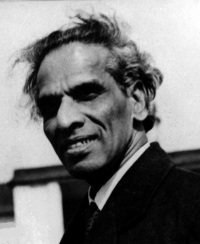
In this path-breaking chapter in publishing history, Sir Allen Lane’s companion-in-arms was a young, hot-headed Indian nationalist, of aristocratic lineage, who rose to become a diplomat and statesman, and whom Time magazine and others described as ‘the second most powerful man in India’, next only to Jawaharlal Nehru, India’s first prime minister. This was V.K. Krishan Menon.
Sir Allen Lane edited the fiction that Penguin would put out, and Krishna Menon edit the light blue-covered Pelican imprint.
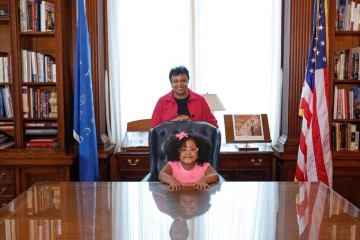
So many books … so little time. But not for 4-year-old Daliyah Marie Arana of Gainesville, GA who, at the beginning of this year, was hosted as ‘Librarian For The Day’ at the Library of Congress, by Carla Hayden, the 14th Librarian of the world’s largest library, and first woman and African American to hold that post.
Daliyah has already read, or had read to her by her parents, 1000 books. Yes, indeed, 1000 books.
‘Books are of the people, by the people, for the people,’ she croons.’Literature is the most immortal part of history.’ Is it any wonder she was invited to Washington by Librarian of Congress Carla Hayden?
Have I read 1000 books? I don’t know. I never thought to count, I was just happy reading them. All our children cannot be Daliyah — she is a prodigy. But, it is our duty to foster in them an early love of reading.
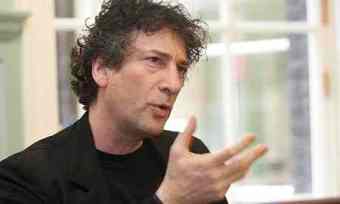
Neil Gaiman, who has been writing for adults and childden for thirty years, in a talk on ‘Why We Read and What Books Do for the Human Experience’, said: ‘The simplest way to make sure that we raise literate children is to teach them to read, and to show them that reading is a pleasurable activity. And that means, at its simplest, finding books that they enjoy, giving them access to those books, and letting them read them.
‘I don’t think there is such a thing as a bad book for children. … There are no bad authors for children, that children like and want to read and seek out, because every child is different. … Do not discourage children from reading because you feel they are reading the wrong thing. … We need our children to get onto the reading ladder: anything that they enjoy reading will move them up, rung by rung, into literacy.’
(Photograph courtesy Robin Mayes)
So little time? Maybe, but, let us make the most of it, reading what we enjoy, what we want to read, putting down a book half-read since it fails to hold our interest, because there is a vast ocean of literature out there, just waiting for us to dip into it …

Meena, you’ve chosen a topic closest to my heart 🙂
LikeLike
Very emotional and well written blog. Enjoyed it. Gooloo
LikeLike
I am a simple reader…no classics or sometimes bestsellers. But till date they are the only escape for me whether from poverty, people or problems ( the 3 p’s). So aI am convinced😊😊 As far as the fact that book will disappear due to technology it was meant for education. You too had graduated to “kindle”????
LikeLike